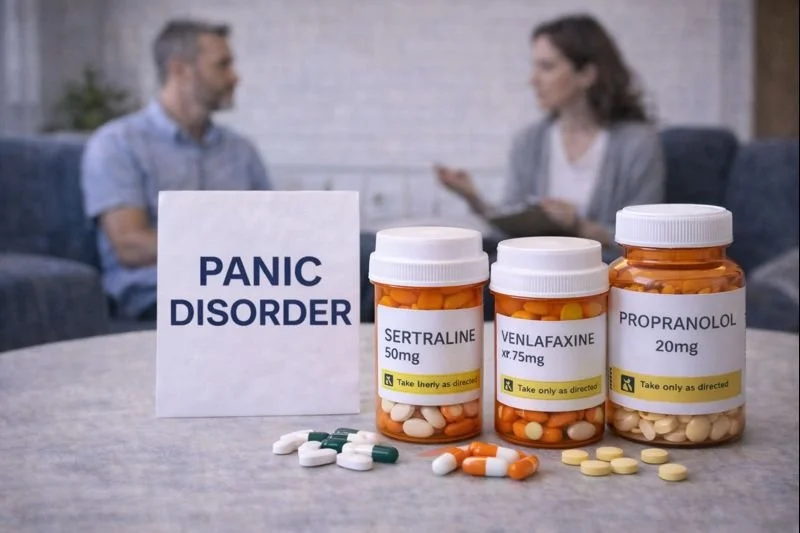Panic Disorder Treatment: What Are Your Best Medication Options?
Panic disorder can be overwhelming, but you're not alone. Whether you've just started experiencing panic attacks or have been managing them for years, effective treatments are available to help you regain control of your life. At Dignity Brain Health, we specialize in psychiatric medication management and tele-psychiatry services for residents in Massachusetts (including Boston, Brookline, Cambridge, Newton, Somerville, and Back Bay), as well as in New Hampshire and Florida.
In this blog, we'll explore the most effective medications for panic disorder, answer common patient questions, and help you take the next step toward lasting relief.
What Is Panic Disorder?
Panic disorder is a type of anxiety disorder characterized by unexpected and repeated episodes of intense fear accompanied by physical symptoms like chest pain, heart palpitations, shortness of breath, dizziness, and abdominal distress. Unlike ordinary anxiety, panic attacks can occur suddenly and without an obvious trigger.
According to the National Institute of Mental Health (NIMH), panic disorder affects approximately 2.7% of U.S. adults each year. Left untreated, it can severely impact your ability to work, maintain relationships, and enjoy daily life.
Common Symptoms of Panic Disorder Include:
Racing heart or palpitations
Trembling or shaking
Feeling of choking
Sweating
Fear of losing control or dying
Nausea or abdominal distress
Chest pain or discomfort
Medication can play a pivotal role in reducing both the frequency and severity of these episodes.
How Can Medication Help with Panic Disorder?
Psychiatric medication can regulate brain chemicals responsible for panic symptoms. These medications don't cure panic disorder but can significantly reduce the intensity and occurrence of attacks when taken as part of a comprehensive treatment plan.
At Dignity Brain Health, our experienced psychiatric clinicians offer personalized medication management plans through secure telehealth visits.
What Are the Best Medications for Panic Disorder?
Choosing the right medication depends on your unique symptoms, medical history, and lifestyle. Here are the primary classes of medications commonly prescribed for panic disorder:
Selective Serotonin Reuptake Inhibitors (SSRIs)
SSRIs are usually the first-line treatment due to their safety and effectiveness.
Examples: Sertraline (Zoloft), Fluoxetine (Prozac), Paroxetine (Paxil)
Benefits: Proven to reduce panic attacks over time with minimal side effects (Bystritsky, 2006)
Time to work: 2–6 weeks
Serotonin-Norepinephrine Reuptake Inhibitors (SNRIs)
SNRIs are another option if SSRIs are not effective.
Examples: Venlafaxine (Effexor XR), Duloxetine (Cymbalta)
Benefits: Shown in studies to reduce panic severity (Pollack et al., 2005)
Time to work: 1–4 weeks
Tricyclic Antidepressants (TCAs)
Older antidepressants that may be useful when newer medications aren’t tolerated.
Examples: Imipramine, Clomipramine
Benefits: Effective for panic but may have more side effects
Time to work: 2–4 weeks (Stein et al., 2000)
How Do I Know Which Medication Is Right for Me?
At Dignity Brain Health, we use genetic testing to help tailor medications to your unique biology. Some people metabolize medications faster or slower, which can affect how well the drug works or how strong the side effects are.
👉 Learn more about genetic testing for psychiatric medications.
We also consider:
Your history with medications
Presence of co-occurring conditions (like depression or ADHD)
Your lifestyle and preferences
Are There Side Effects?
Yes, but most side effects are manageable and subside over time. These may include:
Headache
Nausea
Fatigue
Sleep disturbances
Dry mouth
Our psychiatric nurse practitioners monitor your response closely and adjust doses as needed through regular telehealth check-ins.
Is Medication Alone Enough?
Not always. Many patients benefit from combining medication with therapy such as Cognitive Behavioral Therapy (CBT), which is proven effective for panic disorder. According to the Mayo Clinic, a combination of medication and psychotherapy provides the best long-term outcomes for panic disorder.
Who Is a Good Candidate for Medication?
You may benefit from medication if:
Panic attacks are frequent or disabling
You've tried therapy alone without improvement
You prefer a medical approach to managing anxiety
You're looking for relief while engaging in therapy
Frequently Asked Questions
How quickly does medication start working for panic disorder?
Some people feel better within a week, but full effects usually take 4–6 weeks depending on the medication.
Can I get medication without in-person therapy?
Yes. At Dignity Brain Health, we offer online psychiatric medication management without requiring in-person therapy. Many patients appreciate this tele-psychiatry approach for its convenience and privacy.
Is it safe to take anxiety medication long term?
Yes, when properly managed. SSRIs and SNRIs are safe for long-term use. Benzodiazepines are generally used short-term or as needed.
Local Resources for Panic Disorder in Massachusetts
NAMI Massachusetts: Offers support groups and educational resources
Massachusetts Department of Mental Health: Public programs and support services
McLean Hospital: World-renowned psychiatric hospital affiliated with Harvard Medical School
Why Choose Dignity Brain Health?
We take a compassionate, personalized approach to psychiatric care. Our team of licensed professionals includes clinicians trained and with experience at top institutions like Harvard Medical School, Mass General, and McLean Hospital.
✔ Convenient online appointments ✔ Customized treatment plans ✔ Insurance-friendly
👉 Meet our team: About Us
👉 Learn more about psychiatric medication management
Conclusion: Find Relief from Panic with the Right Medication
Panic disorder can feel paralyzing, but help is within reach. With the right psychiatric medication, ongoing support, and expert guidance, you can reclaim peace and confidence in your daily life.
At Dignity Brain Health, we’re here to walk that journey with you.
👉 Start your your online psychiatric medication consultation process now
References
Bandelow, B., Michaelis, S., & Wedekind, D. (2017). Treatment of anxiety disorders. Dialogues in Clinical Neuroscience, 19(2), 93–107. https://pubmed.ncbi.nlm.nih.gov/28892811/
Bystritsky, A. (2006). Treatment-resistant anxiety disorders. Molecular Psychiatry, 11(9), 805–814. https://pubmed.ncbi.nlm.nih.gov/16553529/
Pollack, M. H., Lepola, U., Koponen, H., Simon, N. M., Worthington, J. J., & Tedeschi, M. (2005). A double-blind study of extended-release venlafaxine in the treatment of panic disorder. American Journal of Psychiatry, 162(2), 291–298. https://pubmed.ncbi.nlm.nih.gov/15769755/
Stein, M. B., & Sareen, J. (2000). Clinical practice. Generalized anxiety disorder. New England Journal of Medicine, 373, 2059–2068. https://pubmed.ncbi.nlm.nih.gov/10743990/

